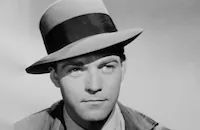The Smartest Girl in Town is one of five movies of the mid-1930s in which Sothern and Raymond are romantic partners; the others are Hooray for Love (1935), Walking on Air (1936), There Goes My Girl (1937) and She's Got Everything (1937). Three decades later, both were cast in the political drama The Best Man (1964). According to film historian David Shipman, the pair didn't get along at all and actively disliked working together. Raymond wrote the song "Will You?" for The Smartest Girl in Town and sings it in the film to Sothern whose answer, by the way, is "No." In another tart exchange, Raymond asks if he may smoke and Sothern snaps, "Go ahead, if you think you're so hot."
Sothern, once dubbed "Queen of the B's," lent her sparkle to many modestly budgeted movies of the 1930s. Two years after The Smartest Girl in Town, she found her career faltering and was reduced to playing the second lead to Joan Bennett in United Artists' Trade Winds (1938). But she stole the film playing a Sadie Thompson-like tart with a heart of gold, and her performance convinced MGM that she would be perfect for an upcoming series of Maisie movies, once planned for Jean Harlow. Maisie (1939) set Sothern on a new career path that would include a seven-year MGM contract, some plum movie roles and two highly successful television sitcoms.
Producer: Edward Kaufman, Samuel J. Briskin (Executive Producer, uncredited)
Director: Joseph Santley
Screenplay: Viola Brothers Shore, from story by Muriel Scheck and H. S. Kraft
Art Direction: Van Nest Polglase, Al Herman (Associate)
Cinematography: J. Roy Hunt
Costume Design: Bernard Newman
Editing: Jack Hively
Original Music: Gene Raymond (song)
Principal Cast: Ann Sothern (Frances "Cookie" Cooke), Gene Raymond (Dick Smith), Helen Broderick (Gwen), Eric Blore (Lucius Philbean), Erik Rhodes (Baron Torine), Harry Jans (Terry).
BW-58m.
by Roger Fristoe























